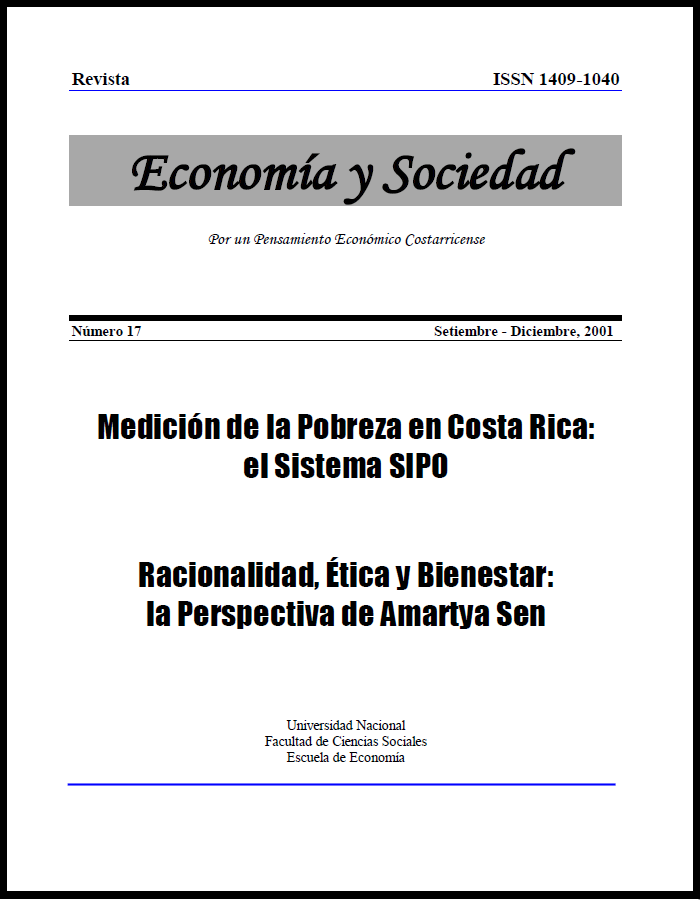RACIONALIDAD, ÉTICA Y BIENESTAR: Estudios de ética de la economía en la perspectiva de Amartya Sen
Palavras-chave:
Racionalidad, ética, bienestar, sensibilidad social, hambruna.Resumo
Amartya Sen, se considera a sí mismo como “uno más” de los economistas de la corriente principal quien, tan sólo, ha intentado llamar la atención del resto de sus colegas sobre la existencia de problemas a los que pocas veces dedican su análisis (Swedberg, 1990: 259). Sin embargo, al recorrer las páginas de sus numerosos libros y artículos nos llama la atención un tratamiento de la disciplina económica que no es, para nada, reflejo de la imagen habitual de los profesionales de la tendencia dominante en la economía. No que no maneje los conceptos y la lógica fundamental de ésta. Todo lo contrario. Su exquisita formación demuestra conocimiento de la tradición neoclásica, una capacidad en el uso de la formalización matemática, y un dominio de la econometría, que no le dejan a la zaga de ningún otro economista de los que definen el panorama actual de la profesión.
Sin embargo, lo sorprendente en él, es que no se limita a moverse en el ámbito definido por los intereses de la corriente principal, sino que se pasea con comodidad en el conocimiento de los clásicos y trasciende los límites habitualmente considerados como fronteras de la economía, para utilizar instrumentos analíticos de lo que algunos pudieran considerar sociología, así como para profundizar en el campo filosófico.
Referências
Aoku, Masahiko (1989), Information, Incentive and Bargaining in the Japanese Economy, Cambridge University Press
Basu, K., Pattanaik, P. And Suzumura, K., edit. (1995), Choice, Welfare and Development. A Festscrift in Honour of Amartya Sen. Introduction. Clarendon Press Oxford.
Blaug, Mark (1985) La metodología de la economía o cómo explican los economistas, Alianza editorial, Madrid.
Casas Pardo, José (1995), Estudio Introductorio a Amartya Kumar Sen, “Nueva Economía del Bienestar. Escritos seleccionados”. Universitat de València, España.
Chaves, Jorge Arturo (1999) De la Utopía a la política económica. Para una ética de las políticas económicas. San Esteban - EDIBESA, Salamanca - Madrid.
Daly, Herman y J. COBB, Jr. (1989), Para el bien común. Reorientando la economía hacia la comunidad, el ambiente y un futuro sostenible. Fondo de Cultura Económica, México, D.F.
Dickey, Laurence (1986), Historicizing the “Adam Smith Problem”: Conceptual, Historiographical and Textual Issues. The Journal of Modern History, vol. 58, Issue 3 (Sep. 1986) 579 - 609.
Dore, Ronald (1987), Taking Japan seriously: a Confucian perspective on Leading Economic Issues, Stanford University Press.
Evensky, Jerry (2001), Adam Smith’s lost legacy, Southern Economic Journal 67, 3(2001)
Friedman, M. (1986) La metodología de la economía positiva, en “Filosofía y teoría económica” F. Hahn y M. Hollis, compiladores, FCE, México, D.F. 1986
Hodgson, Geoffrey M. (1995), Economía y evolución. Revitalizando la economía. Celeste Ediciones. Madrid.
Klamer, Arjo (1989), A conversation with Amartya Sen, The Journal of Economic perspectives, vol. 3, Issue 1 (Winter, 1989), 135 - 150.
Kuhn, Thomas S. (1971), La estructura de las revoluciones científicas, Fondo de Cultura Económica, México, D.F.
Morishima, Michio (1982), Why Japan has ‘succeded’? Western Technology and Japanese Ethos. Cambridge University Press.
Mouchot, Claude (1996), Méthodologie Économique, Hachette, Paris.
Myrdal, Gunnar (1967), El elemento político en el desarrollo de la teoría económica, Gredos, Madrid.
Myrdal, Gunnar (1968), Value in Social Theory. A selection of Essays on Methodology by Gunnar Muyrdal, edited by Paul Streeten, Routledge and Kegan, London.
Nieli, Russel (1986), Spheres of Intimacy and the Adam Smith Problem, Journal of the History of the Ideas, Vol. 47, Issue 4 (Oct.- Dec. 1986), 611- 624.
Pressman, Steven & Summerfield, Gale (2000), The Economic Contributions of Amartya Sen. Review of Political Economy, Vol. 12, Number 1, 2000.
Putnam, Hilary (1993), La objetividad y la distinción ciencia - ética, en Martha C. Nussbaum y Amartya Sen, (compil.), Fondo de Cultura Económica, México, D.F.
Sen, Amartya (1998), Autobiography, Les Prix Nobel 1998, en The Oficial Web Site of the Nobel Foundation.
Sen, Amartya (1999), The Possibility of Social Choice, en The American Economic Review, Vol. 89, n. 3, June 1999. Originalmente fue presentado como conferencia magistral pronunciada con ocasión de recibir el Premio Nobel de Economía de 1998, en Estocolmo.
Sen, Amartya, (1993b), Money and Value. On the Ethics and Economics of Finance. En: Economics and Philosophy, 9 (1993) 203 – 227.
Sen, Amartya, (1997), Economic, business principles and moral sentiments. BEQ, vol. 7, Issue 3.
Sen, Amartya, (2000), What difference can Ethics make? International Meeting on Ethics and Development, IADB, December 2000.
Sen, Amartya, (1967) The Nature and Classes of Prescriptive Judgements, Philosophical Quaterly, Volume 17, Issue 66 (Jan., 1967) 46 - 62.
Sen, Amartya, (1980) Description as Choice, Oxford Economic Papaers, 32 (Nov. 1980). Publicado de nuevo en Amartya Kumar Sen, Nueva Economía del Bienestar. Escritos seleccionados. Universitat de València, 1995.
Sen, Amartya, (1984), The Profit Motive, en “Resources, values and Development”, Harvard University Press, Cambridge, Massachussets - London, England.
Sen, Amartya, (1985), The Moral Standing of the Market, en Ethics and Economics, ed. By Ellen Frankel, Jeffrey Paul, Fred D. Miller, Jr. Oxford, OX, UK, New York, N.Y. B. Blackwell for the Social Philosophy and Policy Center, Bowling Green State University.
Sen, Amartya, (1986), Adam Smith’s Prudence, en “Theory and Reality in Development. Essays in honour of Paul Streeten. Ed. By Sanjaya Lall and Frances Steward, MacMillan, HoundMills, Basingstoke, Hampshire, and London.
Sen, Amartya, (1989): Sobre ética y economía, Alianza Universidad, Madrid, España. Original en inglés en (1987), On Ethics and Economics. Blackwell, Oxford UK, and Cambridge USA.
Sen, Amartya, (1993a), Does business ethics make economic sense? Business ethics quaterly, Vol. 3, Issue 1.
Sen, Amartya, (1995), Moral Codes and Economic Success, en Market Capitalism and Moral Values: Proceedings of Section F (Economics) of the British Association for the Advancement of Science, Keele 1993, Ed. By Samuel Brittain and Alan Hamlin, Pub. Aldershot, Hand, England, Brookfield, Vt. USA.
Sen, Amartya, (1998) Autobiography, en Les Prix Nobel 1998, The Official Web Site of the Nobel Foundation.
Skinner, A.S. and WILSON, T., ed. 1975, Essays on Adam Smith, Oxford, Clarendon Press.
Smith, Adam., (1776) “An Inquiry into the Nature and Causes of the Wealth of Nations”, re-publicado en español (19927ª) en Investigación sobre la naturaleza y causas de la riqueza de las naciones, Fondo de Cultura Económica, México, D.F.
Smith, Adam., (1790), The Theory of Moral Sentiments” republicado en español (1997) La teoría de los sentimientos morales, Alianza editorial, Madrid.
Swedberg, Richard 1990. Economics and Sociology: Redefining their Boundaries: Conversations with Economists and Sociologists, Princeton University Press, Oxford. Ch. 14: Amartya Sen.
Walsh, Vivian, (2000), Smith after Sen, Review of Political Economy, v. 12, n. 1 (January 2000) 5 - 25.
Winch, Donald (1978), Adam Smith’s Politics. Cambridge, Cambridge University Press, UK.
Downloads
Publicado
Como Citar
Edição
Seção
Licença
This publication is subject to the Creative Commons License; therefore, its attributions and restrictions must be respected.
Authors publishing in this Journal accept the following conditions:
- Authors retain copyright ownership and give the Journal first publication right of the paper, which is registered with the Creative Commons Attribution-NonCommercial-ShareAlike 4.0 International License. This license allows third parties to use the published work provided it is sourced as firstly published in this Journal.
- Authors may enter into other independent and additional contractual agreements for the non-exclusive distribution of the article published in this Journal (e.g., to be included in an institutional repository or published in a book) provided it is clearly stated that the work was published in this Journal for the first time.
- Authors are allowed and recommended to publish their work on the Internet (for example, on institutional or personal pages) before and during the review and publication process, as it can lead to productive exchanges and a greater and faster dissemination of work published.

The Economía & Sociedad Journal, published by Universidad Nacional, is licensed under a Creative Commons Reconocimiento-NoComercial-CompartirIgual 4.0 Internacional License. Based on http://www.revistas.una.ac.cr/index.php/economia.








